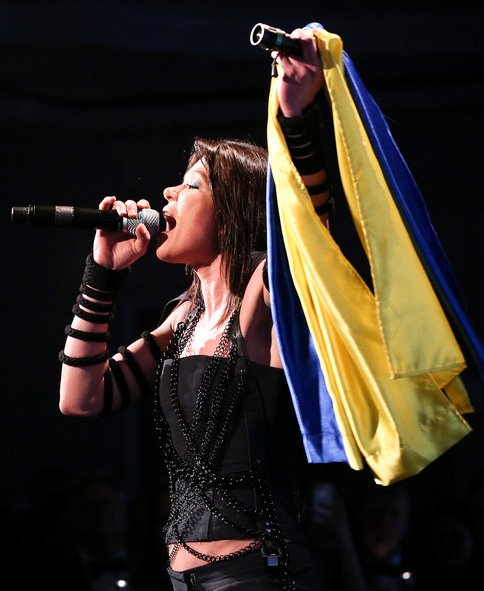Her Chances of Moving Policy or Preventing a War Are Less Clear
While song and emotion come effortlessly for Ukrainian musician and pro-democracy activist Ruslana Lyzhychko, she says she’s nervous about speaking publicly in English, a language with which she struggles. But Wednesday night she delivered a meticulously practiced appeal for Ukraine to 900 of Washington and Europe’s foreign policy and business elite. When she finished with a soaring rendition of Ukraine’s national anthem, the crowd was on its feet, and Ruslana had turned a ballroom of the Ritz Carlton Hotel into an outpost of Kyiv’s Maidan.
It’s unclear, of course, whether even the most moving appeals will yield a US-European confrontation of Russia that might deter if from invading Ukraine. Hours before Ruslana sang, Vice President Joe Biden announced a visit to Poland and elsewhere in Europe by President Obama in June. That is, after a month that contains possible triggers for an invasion, such as a May 11 secessionist referendum proclaimed by Russian-allied gunmen in eastern Ukraine, and the May 25 election for a Ukrainian president.
Ruslana’s audience Wenesday, the fundraising gala at which the Atlantic Council presents annual awards for leadership in building transatlantic relations, was often a noisy chat-fest. Atlantic Council CEO Fred Kempe carried a glass and knife to the podium to ding-ding for attention, and European Commission President Jose Manuel Barroso joked from the podium that he had gotten more disciplined listenership from his students years ago at Georgetown University.
But Ruslana, known in the musical and Slavic worlds by her first name, took the room in a seizure-by-passion. It began as soon as the motherly prime minister of Latvia, Laimdota Straujuma, introduced her, recalling Ruslana’s nightly rallying of Ukraine’s pro-democracy demonstrators amid winter snow and bitter cold at Kyiv’s Maidan Nezalezhnosti. “I am reminded of my country’s singing revolution 25 years ago,” Straujuma said. Ruslana bounded up to the stage in a black outfit, a blue-yellow Ukrainian flag around her neck, and wrapped Straujuma in the kind of passionate, daughterly hug you see at airport arrival gates, not black-tie dinners.
In the throaty alto that won Ruslana the Eurovision song contest a decade ago, she spoke softly, slowly to a silenced room. She condemned Russian President Vladimir Putin for his military seizure of Crimea and his government’s not-really-covert backing of the armed and masked squads of gunmen who are seizing control of eastern Ukrainian cities. “Putin uses just one rule – that there are no rules for him,” she almost whispered into the microphone.
Less expected was her blunt callout of President Barack Obama.
“Who is the leader of the world today?” she asked an audience that included Defense Secretary Chuck Hagel. Then slowly, her pronunciation meticulous: “Here is my appeal to America. Mr. President Obama: Words cannot stop tanks. A war can only be stopped with resolute action. Be the leader. Stop the war. Help Ukraine keep its freedom. … You are acting as if Putin is on Mars but not on Earth.”
Ukrainians who share Ruslana’s determination to keep Ukraine independent and whole already have lost the option that Ruslana really wants, to “stop the war.” Russia holds Crimea and its separatist allies control cities and towns across the heavily industrialized Donbas region of southeastern Ukraine. Moscow threatens a full-scale, conventional invasion if Ukraine contests that control.
In any such invasion, the Ukrainians “are not going to beat the Russians out in the open field when thousands of tanks move in,” according to former national security advisor Zbigniew Brzezinski. “They’ll only beat them one way: prolonged urban resistance,” Brzezinski said in a conference on Europe’s future that the council held before Wednesday’s fundraiser. He urged the Obama administration to tell Russia clearly now that the United States and its allies will arm Ukrainians with the arms – such as shoulder-fired anti-tank weapons and missiles – for a long, grinding war in cities such as Donetsk.
“If we are to deter the Russians from moving in, we have to convince the Russians that it will be costly and prolonged. …The Ukrainians will only fight if they think they will eventually get some help from the West,” including weapons, Brzezinski said. “If they do resist, it’s going to be like the Spanish Civil War.”
Ruslana has been making speeches in Washington and European capitals for months, and she doesn’t get far into the weeds of policy choices. She did call Wednesday for western sanctions against the big, state-run companies that prop up Russia’s economy – the gas producer Gazprom and the oil company Rosneft.
But mainly, her message is simple. “Help us,” she said Wednesday night. “Do everything to save human lives.”
Ukraine already has reached the point where either lives – or some of its independence – will be lost.
James Rupert is managing editor at the Atlantic Council.
